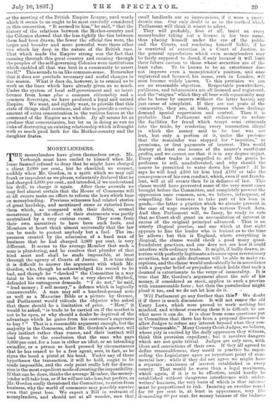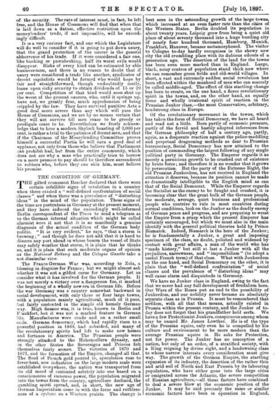MONEYLENDERS.
THE moneylenders have given themselves away. Mr. Yerburgh must have smiled to himself when Mr. Isaac Samuel refused to deny that he might have charged a client 2,000 per cent., but he chuckled, we suspect, audibly when Mr. Gordon, in a spirit which we may call frank or impudent as we please, voluntarily declared that he had charged 3,000 per cent., and intended, if we understand his drift, to charge it again. After these avowals we may feel almost certain that the House of Commons will at all events make an effort to reform the laws which bear on moneylending. Previous witnesses had related stories of great hardship, and mentioned sums as extorted from them which, as compared with their debts, seemed monstrous ; but the effect of their statements was partly neutralised by a very curious cause. They seem from their own narratives to have been such fools, and Members at heart think almost universally that the law can be made to protect anybody but a fool. The im- pression created by the admission of a hard man of business that he had charged 3,000 per cent. is very different. It seems to the average Member that such a man is plundering, and he resolves that plunder of that kind must and shall be made impossible, at least through the agency of Courts of Justice. It is true that it is difficult to answer the argument with which Mr. Gordon, who, though he acknowledged his record to be bad, and though he " checked " the Committee in a way fatal to his own case, must be a very shrewd Shylock, defended his outrageous demands. "I do not," he said, " lend money ; I sell money," a defence which is logically unanswerable. A man may sell a hundred-pound note as well as a Mazarine Bible or a picture by Greuze, and Parliament would ridicule the objector who asked that there should be a limitation of price. "How," it would be asked, "is trade to be carried on if the market is not to be open, or why should a dealer be deprived of the advantage which he gains from his customer's eagerness to buy ? " That is a reasonable argument enough, but the majority in the Commons, after Mr. Gordon's answer, will obey instinct rather than reason, and their instinct will lead them to the conclusion that the man who pays 3,000 per cent. for a loan is either an idiot, or an intending swindler, or a person so hard pressed by circumstances that he has ceased to be a free agent, sees, in fact, as he signs the bond a pistol at his head. Under any of these hypotheses the transaction, it will be held, ought to be made impossible, and the only point really left for discus- sion is the most expedient mode of creating the impossibility. If that can be done, thinks the average Member, the money- lender will take less, or if he willnot take less, but prefers, as Mr. Gordon coolly threatened the Committee, to retire from business, why the world of commerce may possibly survive even that great loss. We expect a Bill in restraint of moneylenders, and should not at all wonder, now that small landlords are so impecunious, if it were a prett-, drastic one. Our only doubt is as to the method which Parliament will think it wisest to adopt. They will probably, first of all, insist on every moneylender taking out a license in his true name, thus placing himself under the eye of the public and the Courts, and rendering himself liable, if ho is convicted of extortion in a Court of Justice, to the general opprobrium which even moneylenders may be fairly supposed to dread, if only because it will limit their future custom to those whose securities are of the least value. To be known to be an extortioner does not improve even a moneylender's position, and once registered and licensed, his name, even in London, will soon become widely known. To this provision we can see no reasonable objection. Respectable pawnbrokers, publicans, and tobacconists are all licensed and registered, and the "stigma" which they all bear with equanimity may also be borne by usurers without the latter having any just cause of complaint. If they are not pests of the community, they are, at least, persons whose dealings demand special supervision and control. Then it is probable that Parliament will endeavour to reduce the facilities for fraud which tempt semi - criminals into the trade, by rendering every transaction illegal in which the money said to be lent was not lent, but only a portion of it, under the pretence that the remainder was stopped for "inquiries," or premiums, or first payments of interest. This would destroy at least one source of the usurer's exorbitant profits, and we cannot see that it is in any degree unjust. Every other trader is compelled to sell the goods he professes to sell, unadulterated, and why should the usurer be permitted to water down his liquor ? If he says he will lend £100 let him lend £100 or take the consequences of his own conduct, which, even if not fraudu- lent, will at all events then be in defiance of law. This clause would have prevented some of the very worst cases brought before the Committee, and completely prevent the oppression once common, now, we believe, infrequent, of compelling the borrower to take part of his loan in goods,—the latter a practice which we already prevent in the case of wage receivers by the various Truck Acts. And then Parliament will, we fancy, be ready to vote that no Court shill grant an accumulation of interest in excess of the original principal advanced:. • That is an utterly illogical proviso, and one which at first sight appears to fine the lender who is lenient as to the time he allows ; but this is England, where everything is illogical, the clause would check a good many quasi- fraudulent practices, and one does not see how it could interfere with ordinary trade. It might, if badly drawn, in- terfere with perfectly legitimate advances upon reversionary securities, but an able draftsman will be able to make ex- ceptions, and the clause would undoubtedly be in accordance with .a popular belief or prejudice which holds .that such a demand is extortionate to the verge of immorality. It is true that Mr. Gordon's argument about the sale of his money, if considered as stock, applies to such a proviso with unanswerable force ; but then the pawnbroker might plead it too, and we do not let him do it.
Will Parliament go any further than this?" We .doubt it if there is much discussion. It will not renew the old Usury Laws, which were proved to work nothing but mischief, and without renewing them it is difficult to see what more it can do. It is clear from some questions put in Committee that there has been a proposal discussed to allow Judges to refuse any interest beyond what they con- sider "reasonable." Many County Court Judges, we believe, whose pity is excited by the daily oppression they witness, think this provision expedient; but it involves dangers, which are not quite trivial. Judges are only men, with ideas and convictions of their own. If they all agreed to define reasonableness, they would in practice be super- seding the Legislature upon an important point of com- mercial law ; while if they did not agree we might have a separate maximum of interest established in every county. That would be worse than a legal maximum, which again, if it is to be effective, could hardly be established without dangerous interference with under- writers' business, the very basis of which is that interest must be proportioned to risk. Insuring an overdue vessel for 80 per cent is, at least in appearance, very like demanding 80 per cent. for money because of the badness of the security. The rate of interest must, in fact, be left free, and the House of Commons will find that when that is laid down as a datum, effective restriction upon the moneylenders' trade, if not impossible, will be exceed- ingly difficult.
It is a very curious fact, and one which the Legislature will do well to consider if it is going to put down usury, that the grand protection of the usurer is the general abhorrence of his trade. If it were considered a fair one, like banking or pawnbroking, half its worst evils would disappear. Risks of every kind can be estimated by able business-men, and there is no reason to doubt that if usury were considered a trade like another, syndicates of decent capitalists would be formed who would hope by fair and straightforward, though undoubtedly costly, loans upon risky security to obtain dividends of 15 or 20 per cent. Competition of that kind would soon shut up the worst of the present usurers, who, until it springs up, have not, we greatly fear, much apprehension of being crippled by the law. They have survived punitive Acts a good deal more severe than any which will pass the House of Commons, and we are by no means certain that they will not survive till men cease to be greedy or prodigals cease to be. Nevertheless we freely acknow- ledge that to hear a modern Shylock boasting of 3,000 per cent. is rather a trial to the patience of decent men, and that if the Chairman of the Moneylending Committee proves himself a successful Portia he will earn a good deal of applause, not only from those who believe that Parliament can prohibit hail, but from the entire community, which • does not see why a man who practically tries to borrow on a mere promise to pay should be therefore surrendered to robbers who, before they can skin him, must believe • kia promise.



































 Previous page
Previous page